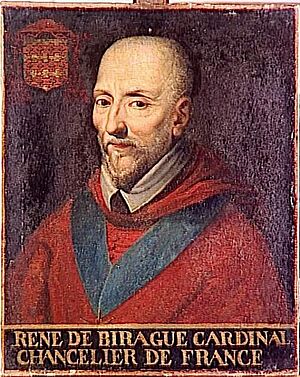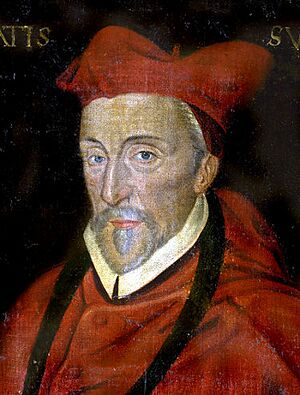René de Birague facts for kids
Quick facts for kids René de Birague |
|
|---|---|
| Bishop of Lavaur Chancellor of France |
|
 |
|
| In Office | 1580-1583 |
| Orders | |
| Created Cardinal | 21 February 1578 |
| Rank | Cardinal-priest |
| Personal details | |
| Born | 1506/7 Milan, Duchy of Milan |
| Died | 24 November 1583 Paris |
| Previous post |
|
René de Birague (born around 1506, died November 24, 1583) was an important leader in France during the 1500s. He was born in Milan, Italy, but his family supported the French kings. Because of this, they had to leave Milan when it was taken over by Emperor Charles V.
René de Birague moved to France and became a trusted advisor to the French kings. He held many important jobs, including a top judge in Turin, a diplomat, and a military leader. Later in his life, he also became a bishop and a cardinal in the church. He played a big role in the French government during a time when France was facing many challenges, including religious wars.
Contents
René de Birague: A French Leader
Early Life and Moving to France
René de Birague was born in Milan, Italy, around 1506 or 1507. His family was well-known and powerful in Milan. However, his family chose to support the French king, Francis I. When the Holy Roman Emperor, Charles V, took control of Milan, René's family had to move to an area controlled by France called Piedmont.
In 1536, the Emperor declared that nobles who had left Milan were criminals if they did not return. René refused to go back, so his family's lands in Milan were taken away. He married Valentine Balbiani, and they had a daughter.
Working for the King
René de Birague started working for the French king in the 1540s. He became the chief judge in the city of Turin, which was then under French control. This job gave him a lot of power in the French-held areas of Italy. He also worked closely with Marshal Brissac, a French military leader.
Helping in Italy
During the Italian Wars, René helped the French army in Italy from his base in Turin. He kept the French court updated on what was happening in Italy. He was also involved in talks that led to the city of Chieri surrendering to the French.
René used his power to stop groups like the Waldensians in Piedmont. This worried some neighboring areas, but his actions were supported by the French king.
Serving King Charles IX
When the French civil wars began, King Charles IX decided to give back some towns in Italy to the Duke of Savoy to make him an ally. René de Birague was part of the group chosen to manage this transfer. France kept control of one important town called Pignerol. In 1563, René was put in charge of the council that governed Pignerol.
That same year, he traveled to Vienna to help arrange the marriage between King Charles IX and Elisabeth de Hapsburg. This was an important diplomatic mission.
Leading in Lyonnais
In 1565, René de Birague was given a special job as lieutenant-general of the Lyonnais region in France. This meant he had military power and could act as governor when the main governor was away. This was an unusual role for someone from an administrative background.
During a religious war, he helped raise a lot of money from the wealthy people in Lyon. He used this money to hire soldiers to protect the city from Protestant rebels. He also supported efforts to stop Protestantism in the region. In 1568, he was replaced in this role.
Becoming Chancellor
In 1570, René de Birague became the garde des sceaux, which meant he held the king's official seals and had the real power of a chancellor. He was officially appointed Chancellor in 1573. As chancellor, he worked to support the king's authority.
He played a key role in arranging the marriage between Marguerite de Valois and Henry of Navarre. This marriage was meant to bring peace between the royal family and the Protestant leaders. The marriage was agreed upon in April 1572. René also helped with talks for an alliance with England against Spain, though this did not lead to a war.
Serving King Henri III
After King Charles IX died, his brother Henri III became king. While Henri was traveling back to France, René de Birague helped his mother, Catherine de Medici, govern the kingdom. He led the royal council during this time.
When Henri III returned, he decided to give back the last French-held towns in Italy to the Duke of Savoy. René de Birague was very upset by this decision. He believed it weakened France's position in Italy and refused to approve it.
Challenges and Accusations
René de Birague was a close advisor to King Henri III. He suggested that the king's brother, Alençon, and cousin, Navarre, should be kept under arrest to prevent them from joining rebellions. However, the king did not follow this advice.
In September 1575, Alençon fled the court and joined a rebellion. He accused René de Birague and other Italian advisors of having too much power and said they should be removed from the kingdom. There were also riots in Paris against Italians, and René was criticized in public writings.
In 1576, Alençon and some friends became sick after drinking wine. Alençon claimed René de Birague had tried to poison him, but no proof was ever found.
Later Years and Cardinalship
In 1578, King Henri III made René de Birague a Cardinal, which is a very high rank in the Catholic Church. That same year, he gave up his direct power as Chancellor, though he kept the title until his death. The king gave him a lot of money to thank him for his service.
René de Birague was also made a commander in the king's new Order of the Holy Spirit in 1580. By 1582, he decided to retire from public life. He sold his home in Paris and moved to a religious house. In March 1583, he joined a religious group called the White Penitents.
René de Birague died on November 24, 1583. King Henri III attended his funeral. His tomb was designed by a famous artist, Germain Pilon.
Images for kids
 | Chris Smalls |
 | Fred Hampton |
 | Ralph Abernathy |




